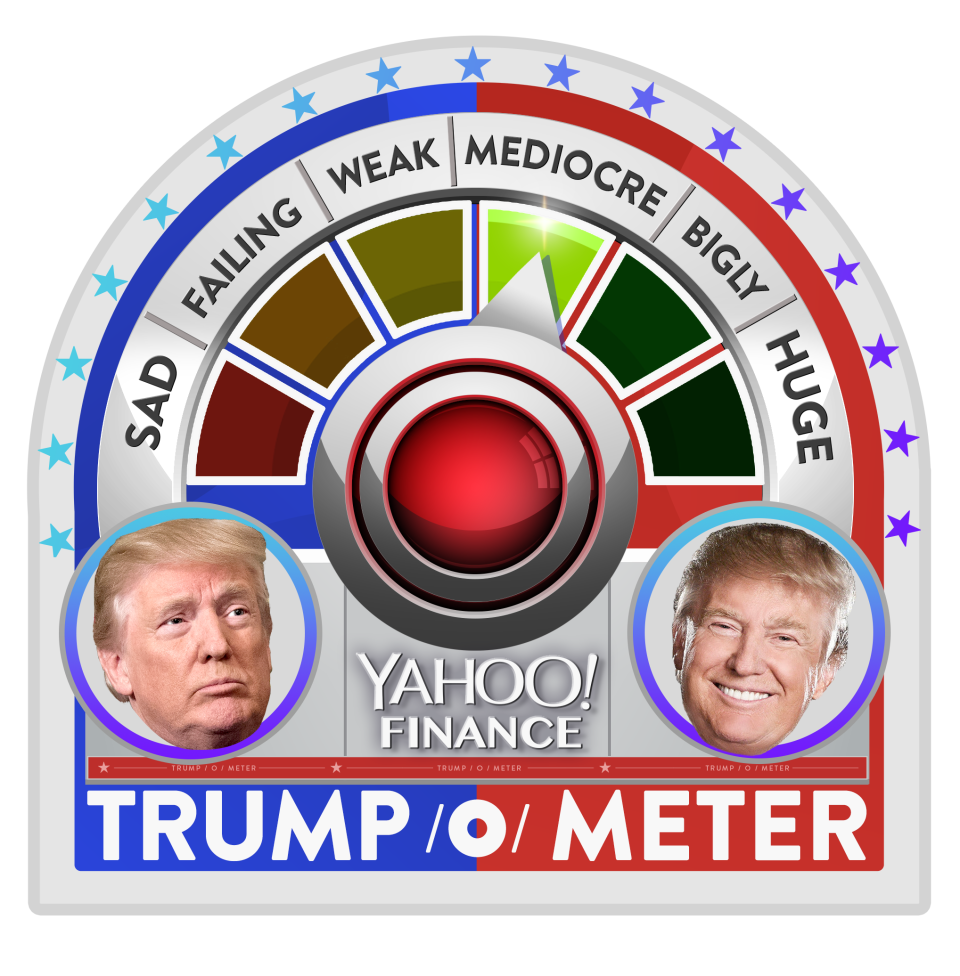This week in Trumponomics: Two 'wins' on trade
President Trump finally has a “deal” he can brag about. Two deals, actually.
During the same week Trump’s impeachment trial began in the Senate, Trump inked his “phase one” deal with China, and the Senate approved the new trade deal with Canada and Mexico. The House approved the Canada-Mexico bill in December, so it’s now a done deal.

Trump can now claim to have fulfilled his campaign promise to revamp trade with Canada and Mexico.
Yet skepticism abounds. The China deal leaves in place new Trump tariffs that cost the U.S. economy about $70 billion per year. The U.S. Mexico-Canada Agreement could actually raise car prices for Americans, because it pushes up labor costs in the auto industry. Some economists think that could be a net drag on the U.S. economy, rather than a boost. On the whole, Trump’s protectionist trade policies will probably not produce benefits that outweigh the costs.
But we’ll cut Trump a break, for once. All politicians overpromise, and Trump can at least point to tangible results on trade. The China deal might even mark a turning point with China that could benefit the United States in the long term, if there’s consistent follow-through for years to come (which China is probably betting against). This week’s Trump-o-meter reads MEDIOCRE, the third-highest score.

Now, for reality. Trump can brag all he wants about these trade deals, but voters aren’t likely to see any meaningful impact by Election Day in November. Or ever, maybe. There are many reasons to doubt China will quickly boost purchases of U.S. farm products at the scale they supposedly promised, for instance, which could leave farmers hurt by the loss of China sales wondering where the cavalry is.
“Score the first round of the trade war a win for Beijing,” Joe Brusuelas, chief economist for consulting firm RSM, wrote of the deal. “The phase one deal looks like a lot like the status quo with higher taxes on U.S. firms amidst a lot of vague promises.”
Most analysts think the USMCA contains some modest improvements over the old NAFTA deal with Canada and Mexico, such as the inclusion of digital commerce that wasn’t part of the old pact. But other than that, it’s largely a rebranding exercise. Many clauses are even drawn from the old Trans Pacific Partnership that Trump vilified as a candidate, and withdrew the country from once he became president. You won’t hear that at any Trump rallies.
The upside for Trump’s re-election chances
Whether Trump will gain any political advantage from these deals depends on three things. First, some voters will believe Trump’s claims about these magical new trade deals, even if they see no evidence. But these Trump supporters would probably vote for Trump no matter what, so that won’t swing any votes.
Second, there could be some swing voters who give Trump credit for trying something new with China and Mexico, even if they don’t see results in their own lives. And they’re not wrong. Despite widespread agreement about China’s trade abuses, nobody had confronted China until Trump. Had Trump found a way to do this without tariffs that punish American businesses and consumers, he would have earned more goodwill from economists, trade experts, and the people who listen to them. Even with the damaging tariffs, China must realize it can’t break the rules with impunity any more.

Third, there could be backsliding in coming months that reveals the hollowness of the Trump trade regime. The USMCA will probably be stable, but the China deal is built on promises and assumptions that could crumble with little notice. If China isn’t serious about its commitments to aggressively ramp up purchases of U.S. exports, Trump could go back to imposing tariffs, which would spook financial markets all over again.
China could also do something provocative to test Trump close to the election, figuring he wouldn’t risk more harmful tariffs in retaliation. China could also try to manipulate trade in a way that’s politically damaging to Trump, if they decide to “meddle” in the election and help the Democrat. Voters wouldn’t necessarily ding Trump for that, unless they feel he’s personally responsible for something that leaves them worse off.
Trade normally isn’t a top-three issue for voters, and there’s no reason to think it will be different in 2020. So the upside for Trump claiming victory may be minimal. The good news for him is voters may not care if his trade “wins” produce little or no measurable benefit.
Rick Newman is the author of four books, including “Rebounders: How Winners Pivot from Setback to Success.” Follow him on Twitter: @rickjnewman. Confidential tip line: rickjnewman@yahoo.com. Encrypted communication available. Click here to get Rick’s stories by email.
Read more:
Read the latest financial and business news from Yahoo Finance
Follow Yahoo Finance on Twitter, Facebook, Instagram, Flipboard, SmartNews, LinkedIn, YouTube, and reddit.

 Yahoo News
Yahoo News 
